Eco-Heroes
Thant Myanmar's Guide to Setting Up Sustainable Rural Waste Management Systems
21 March 2023
by Bryan Yong
A pioneering Burmese waste management NGO stands between a regressing waste problem and a mission to set up basic waste management systems in every rural village.
During World Environment Day on June 5th 2018, the world was called upon to beat plastic pollution. On that same day, the volunteer group Thant Myanmar which was hastily assembled several months prior just gave their first public speech in front of the national parliament. After a string of successful awareness campaigns, ranging from raising big billboards to getting influencers on board, Thant Myanmar got registered in 2019 as a non-profit company that runs on volunteers and grants money.
(Feature Video: Thant Myanmar)
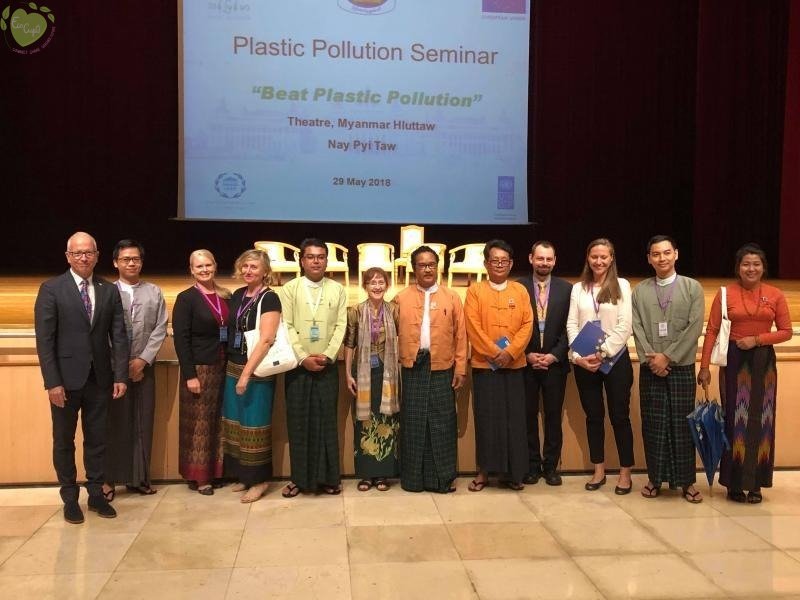
Thant Myanmar giving their first public talk to government officials just in time for World Environment Day 2018. (Thant Myanmar)
Its four main thrusts today are rural waste management, awareness raising, research and development, and education. Very soon, they will be launching a detailed step-by-step guide to set up rural waste management systems for ASEAN countries to follow their lead.

The Thant Myanmar team has stakeholder consultation sessions with local officials. (Thant Myanmar)
From 3 Friends to Thant Myanmar
It all started when a band of 3 friends who despised plastic pollution met by accident. Then 3 became 20. Professionals from all fields gathered their strength and pulled their heavyweight strings to form one of the most significant waste management movements Myanmar has ever seen. The first month went by very productively. Motivation and support were good from organisations, embassies, and everyone else who wanted to get on board. Then the second and third months went by and the energy died down. And sure enough, people disappeared and returned to dealing with their own problems. Then 20 became 1.
“So, now I’m the only one left from that beginning group and the only one who’s still there.”, recalls Friedor Jeske, one of the three friends who founded Thant Myanmar and also the last one standing.
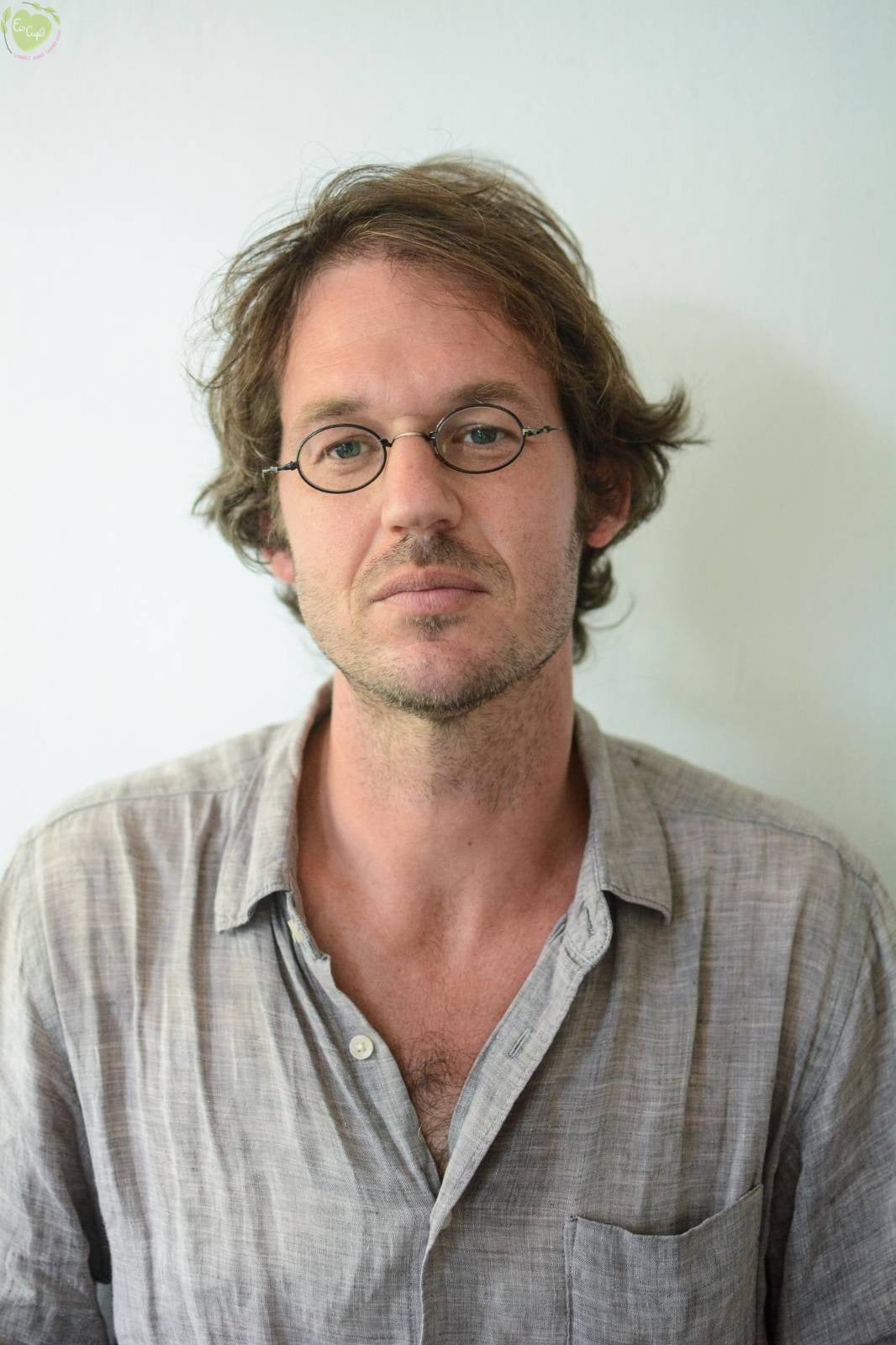
Thant Myanmar’s co-founder and stalwart, Friedor Jeske. (Thant Myanmar)
Friedor was born in Namibia and studied physics in Germany. He became fascinated with Myanmar when he first visited here in 2007. Then he came again in 2011 and 2012 and finally stayed in 2013. He worked in schools and training institutes. One day, almost by accident, Friedor got invited to do research on informal recycling in Myanmar’s capital Yangon.
“And so, I realised this, no one knows anything about garbage. This is a completely open field.”, recalls Friedor, who’s personally interested in waste management issues.
That made him stay in Myanmar and work as a consultant for different organisations in either municipal work or rural areas. For Thant Myanmar, Friedor incorporates his own civil engineering knowledge to support and consult municipalities and ministries through one-off projects or longer-term programmes.
“In the typical NGO kind of work, you run from project to project. So, what you try to do depends on how strong you are on your principles.”, explains Friedor.
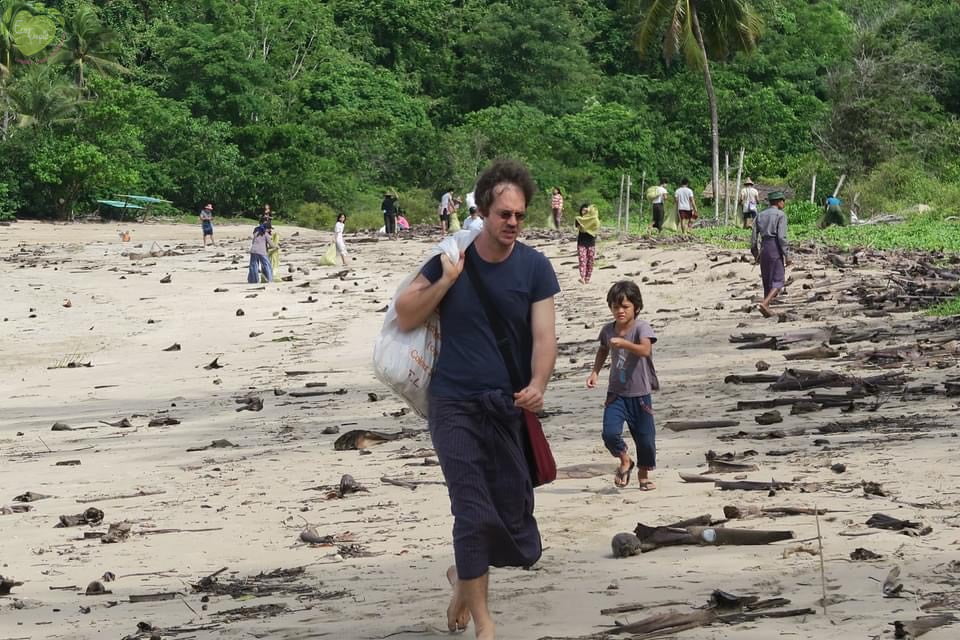
Friedor (centre), who’s personally interested in waste management issues, collects beach plastic to conduct a survey on ocean plastic. The survey is part of Thant Myanmar’s efforts to understand what waves bring to Myanmar’s shores. (Thant Myanmar)
Until now, Thant Myanmar has been working strongly on their own objectives. Fortunately for them, there’s enough money to keep operations alive. But generating activism is a very complex question. The more a volunteer organisation grows, the more it requires its volunteers to be professional. And to keep the professionals you need to be capable of paying fixed salaries.
“Luckily, waste management budgets are always lying around”, quips Friedor.
Myanmar’s Growing Waste Management Crisis
Even with abundant budgets and a strong volunteer front, waste management in Myanmar has been getting worse and worse. Garbage is piling up and getting overlaid by vegetation or swept away by water or burnt into the air. As for education, at least in central areas or towns, there is at least a decent understanding of littering. But on the other side, the willingness for more ridiculous forms of consumption is becoming ever more apparent.
Even going back 10 years, Friedor has not seen lots of change in Myanmar’s waste management issue. He laments that Myanmar has been taking solutions from the past to solve today’s waste issues, i.e., improper disposal.
“No. No. No. I think when I just go back 10 years, I had a similar good view of the problem. I don’t think there’s a lot of change [to Myanmar’s waste management issue].”, says Friedor.
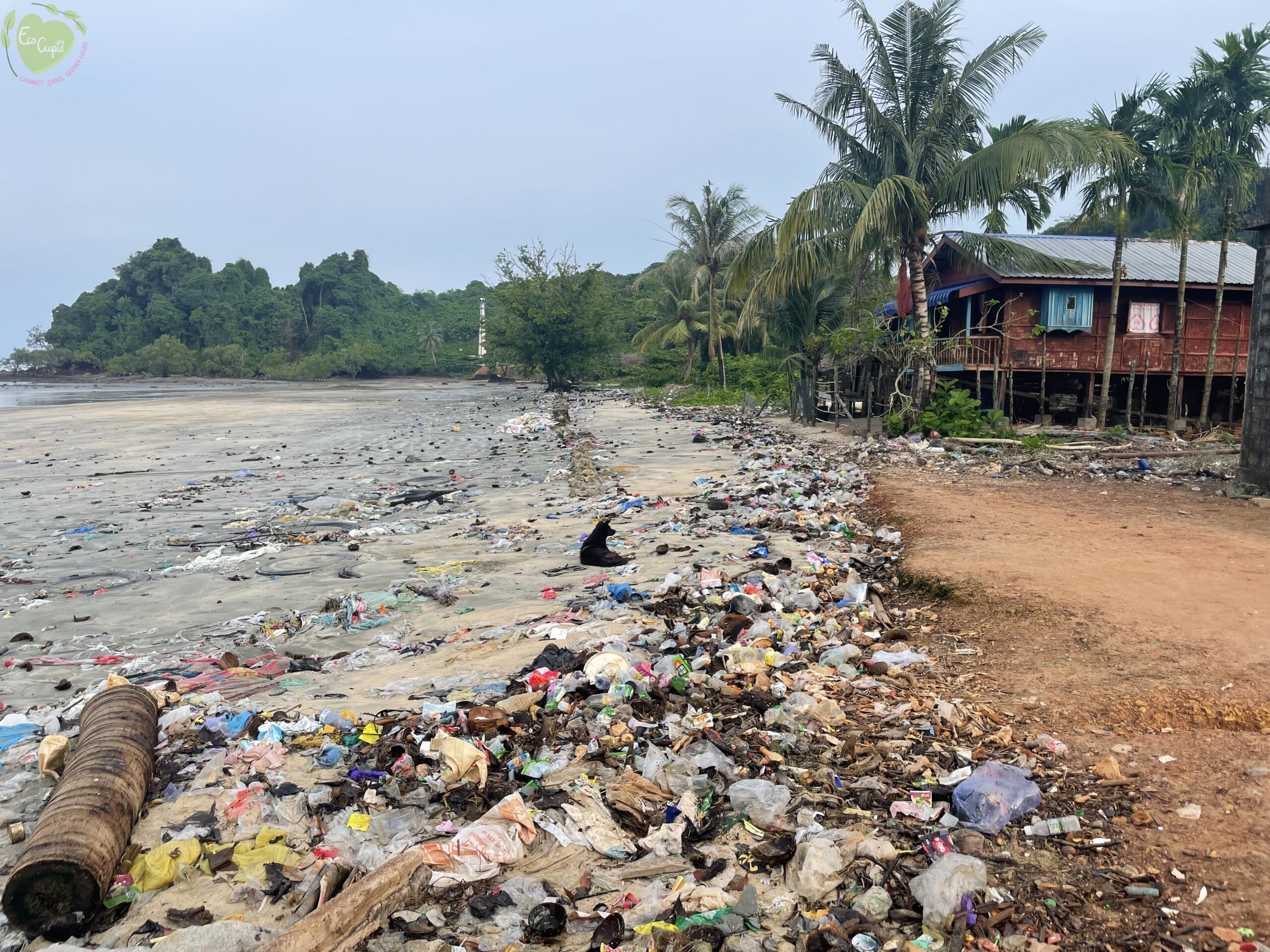
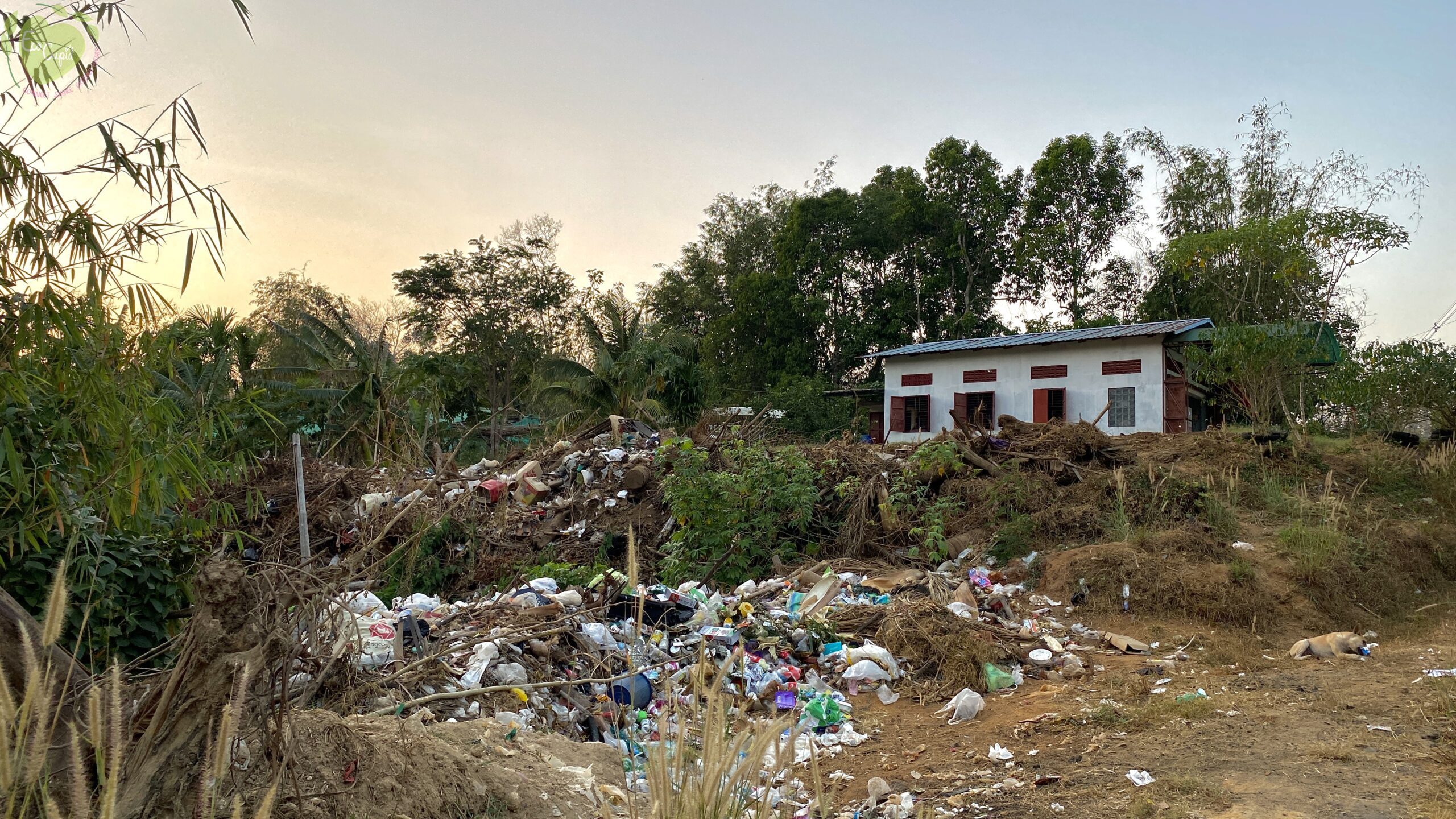
Waste management issues remain rampant throughout Myanmar. Garbage may be left for so long (bottom) that vegetation begins to cover up the garbage pile. (Thant Myanmar)
Empowering Local Communities to Tackle Plastic Pollution
Thant Myanmar is not just another foreign parachute organisation that tries to change the locals from the outside. Change has to happen within the people themselves. What drives Thant Myanmar to its success, is its strong community connections and intercultural knowledge. Most of all, Thant Myanmar understands the importance of letting locals lead the change themselves.
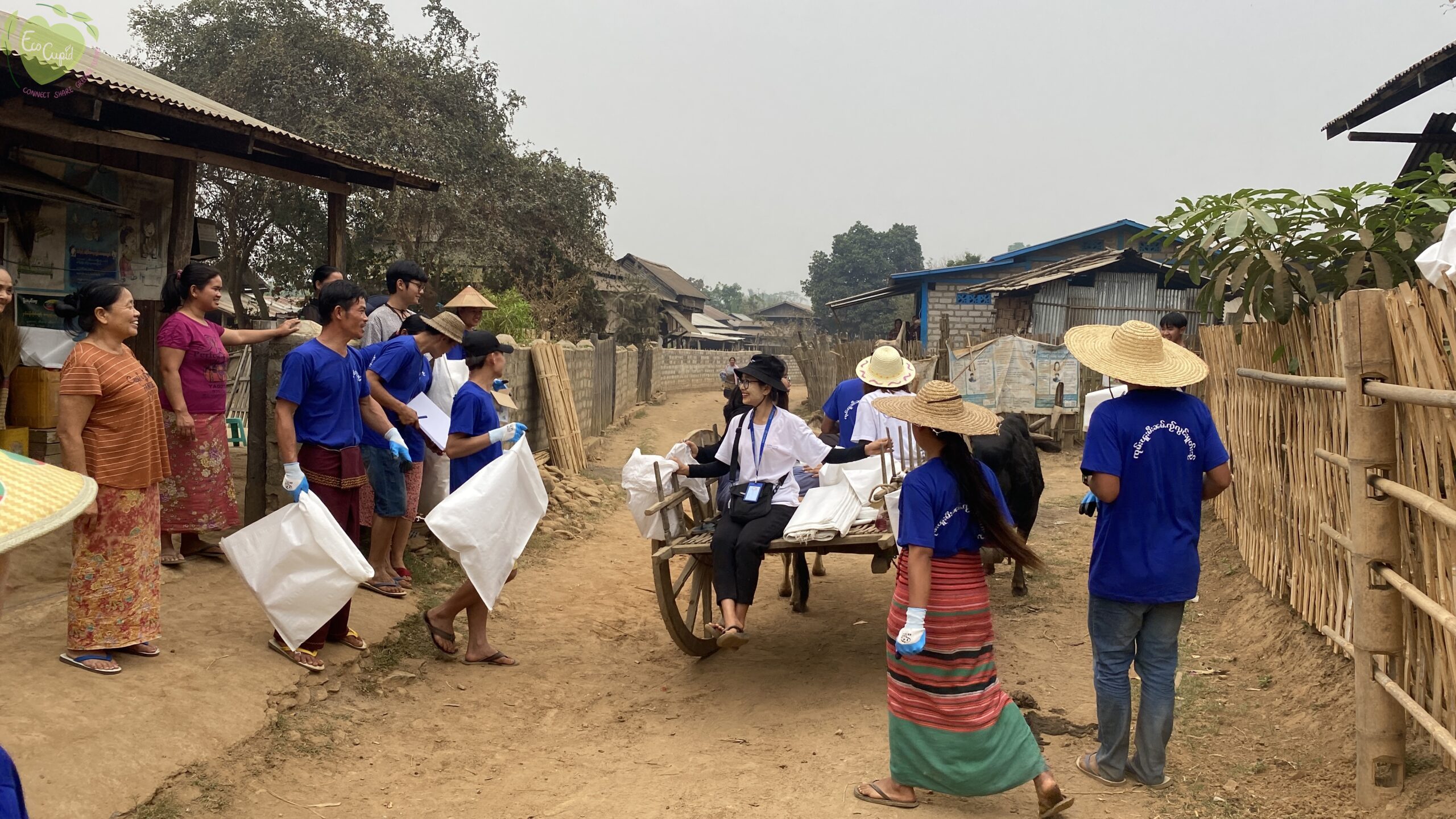
Thant Myanmar’s local youth members take the lead in engaging with rural villagers to advocate for waste management. (Thant Myanmar)
Local Burmese youth Thae Su Aye (Thae Su) has been a powerhouse for Thant Myanmar since 2018 and is currently leading the rural waste management wing of the organisation. Thae Su aims to set up rural waste management systems for all villages, one region at a time.
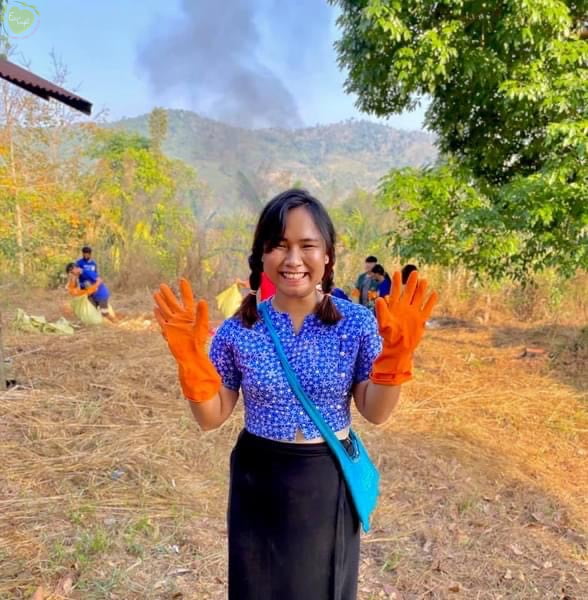
Thae Su Aye leads Thant Myanmar’s rural waste management programme. (Thant Myanmar)
Imagine a scenario where in a typical rural village of about 150 households, the waste that each household generates is about the volume of a football, and over 90% of the waste is organic. There is absolutely no waste management system in place, everyone just burns their waste and their problems are solved.
Setting up a landfill is not sustainable because the landfill continuously grows and no one wants to give their land to become a dump which then becomes useless. What’s worse, is that the Burmese government refuses to give the government land on their claims that they have no responsibility for rural waste management. So, villagers rather burn the waste to clear up landfills than expand another piece of land for the landfill. This is the reality for most rural Burmese villages that Thae Su is trying to change.
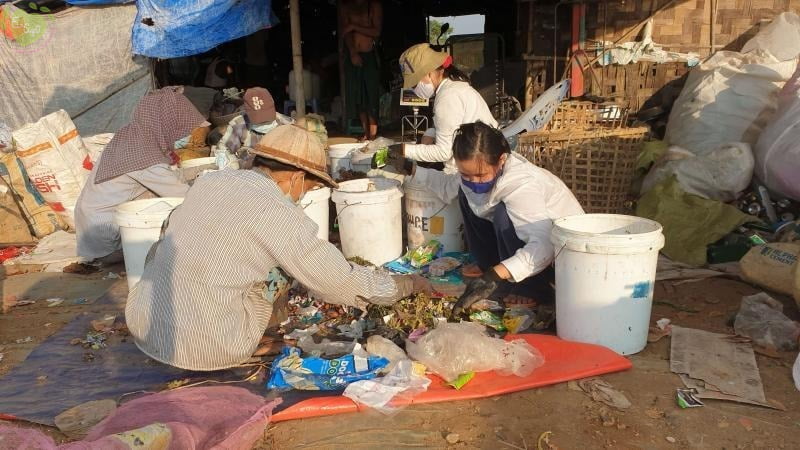
Local villagers sort waste collected from houses throughout their own village. The effort is part of Thant Myanmar’s research efforts to understand the waste generation from rural village households. (Thant Myanmar)
Thae Su explains that going from no waste management to a functioning waste collection system requires a holistic approach. She needs to set up collection and disposal infrastructure, establish trustworthy committees, involve them in every step of decision-making, planning, and eventually the activities themselves, and most of all raise awareness on the whys and hows of waste collection and segregation.
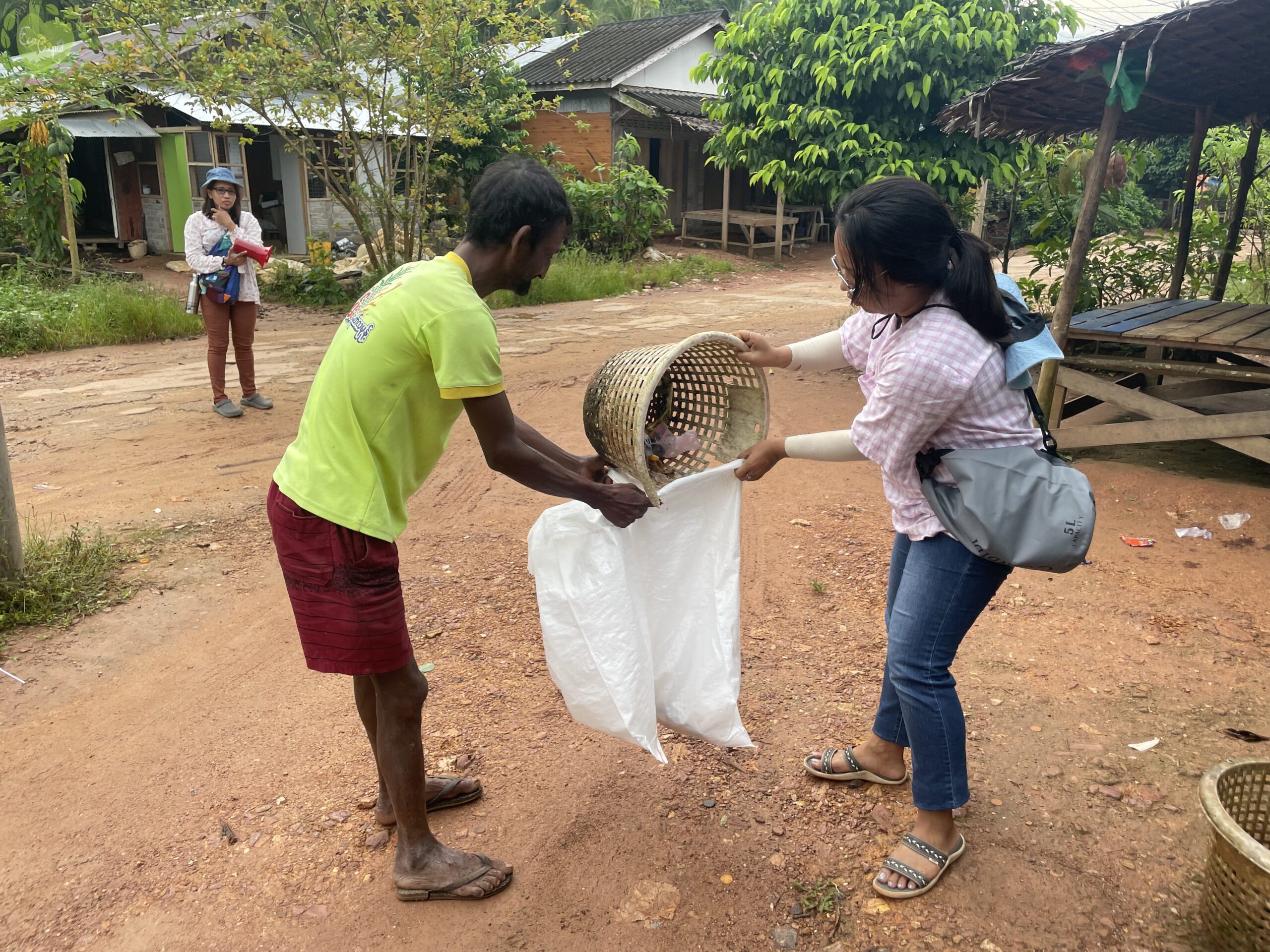
Thae Su helps rural villagers with waste collection. (Thant Myanmar)
If the villagers see the system really works, and that they can solve the waste issue, they themselves will be motivated to continue supporting a waste management system, says Thae Su. Then her job at that stage is to follow up for nearly two months after she left the villagers on their own to make sure that they are able to manage by themselves.
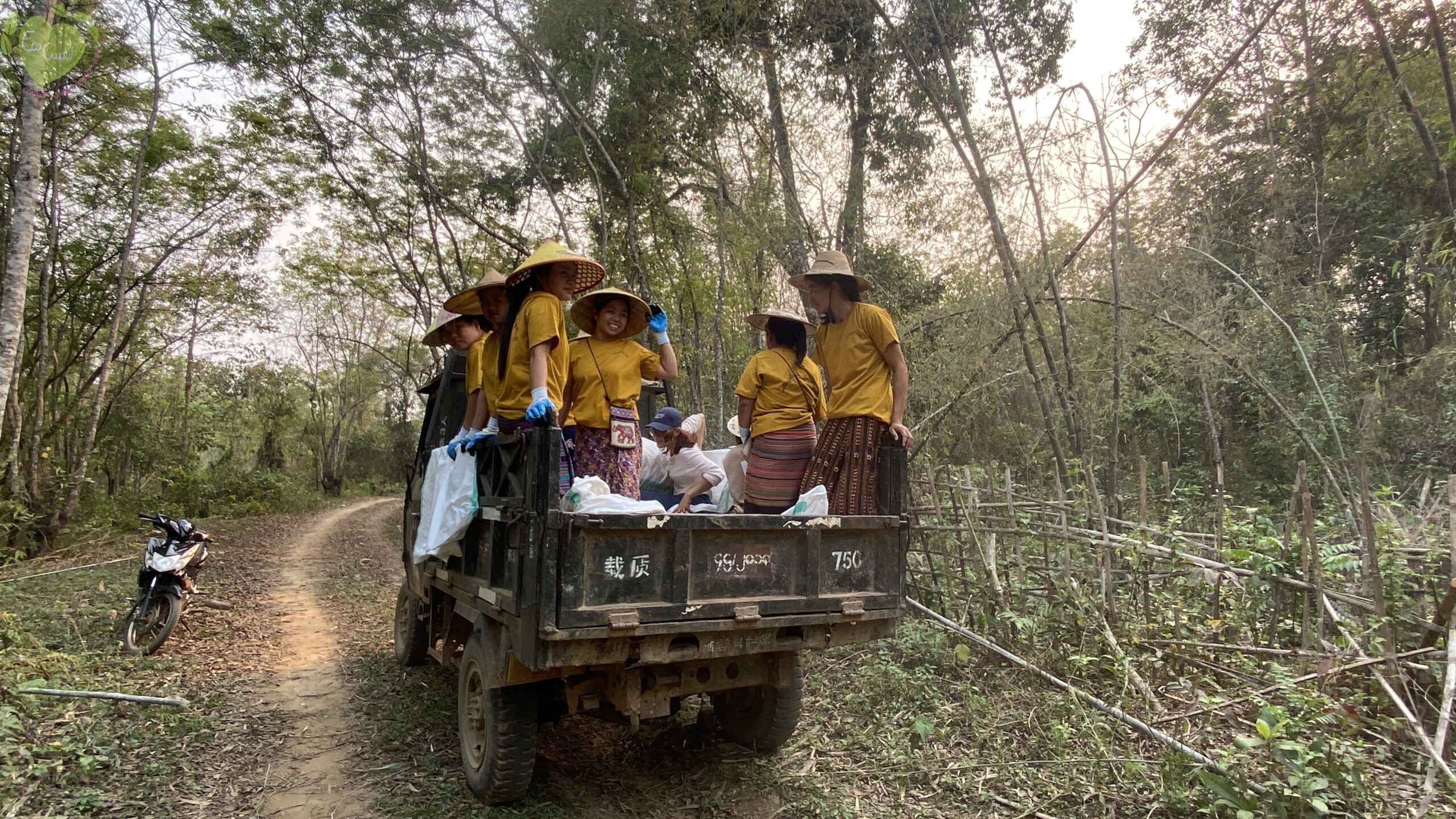
Rural villagers on a truck together with Thant Myanmar on the way to transport collected waste to a nearby disposal facility. (Thant Myanmar)
Friedor adds that working backwards from the last stage of waste management, disposal, first, is key to convincing the community. “Because when they do not have final disposal, why would they go into collection, right?”, says Friedor.
One Waste Management Lesson at a Time
“We educate them on the plastic waste and the impact of the microplastics,” says Thae Su. She further elaborates that normally with villages nearer to the town or the big city, plastic impacts are really obvious, so they’re easier to convince. But villages too far away from the big city are not using much plastic. They cannot see the plastic issue there so it’s more difficult in the villages.
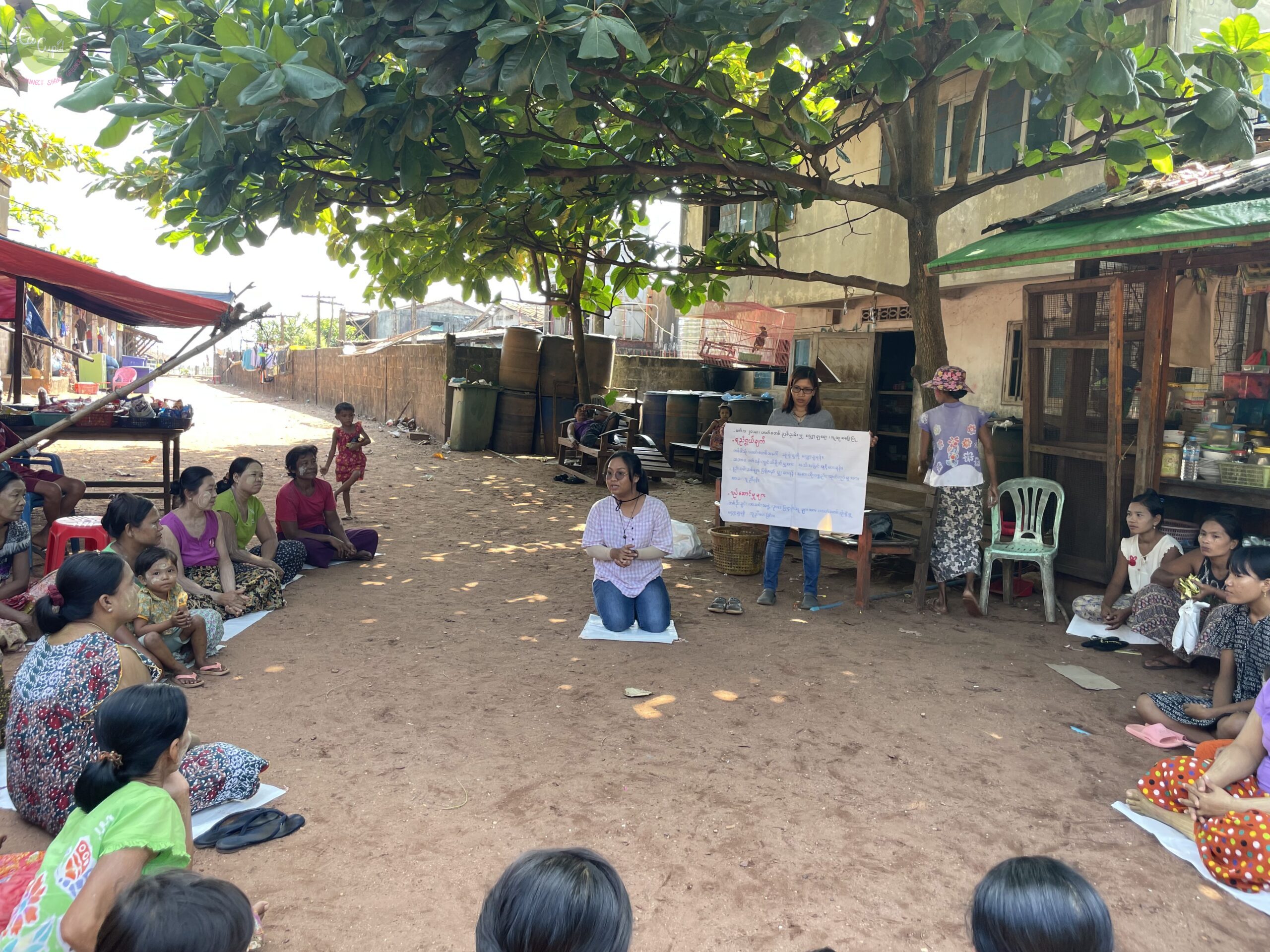
Thae Su spends a lot of time and dedication educating rural villagers about the importance of waste management for the environment and their future generations. (Thant Myanmar)
Thae Su explains direct and indirect plastic impacts from three main angles. The first is income. Villagers who rely on the ocean are really afraid of not getting enough money. They get fish from the ocean but they also accept that annual catches are resulting in fewer fish and more plastic. Second is their future generations. Killing food sources changes everything for the next generation’s home. The third is health issues. Thae Su says that people will feel strange when asked whether they eat plastic. But after she explains that littering plastic in the ocean results in microplastics which then come back into their food chains, people understand.
“If people are still not convinced. We will link that ‘so because of the microplastic, they would get like cancer and also diabetes’. they start to think that plastic is a real issue for them.”, says Thae Su.
To ASEAN Youths: Get on the Ground
“I can see that there are some youths who are interested in the environmental issue or environmental impact but they are still not touching the ground yet. So, if you want to understand what is really happening in the reality, they need to also touch the ground.”, urges Thae Su.
Our featured Eco-Hero
Thant Myanmar is Myanmar’s leading waste management project. With members reaching out to the remotest regions in Myanmar, Thant Myanmar focuses on setting up rural waste management systems and community education. You can reach out to them at https://www.facebook.com/ThantMM

Bryan Yong
Bryan Yong is a freelance environmental journalist and chief editor for EcoCupid. With a background in oceanography and experience volunteering with youth environmental NGOs in Malaysia, he brings curiosity and enthusiasm to discover Southeast Asia’s environmental movement through his stories. Bryan is an avid traveller and loves local food the most.
